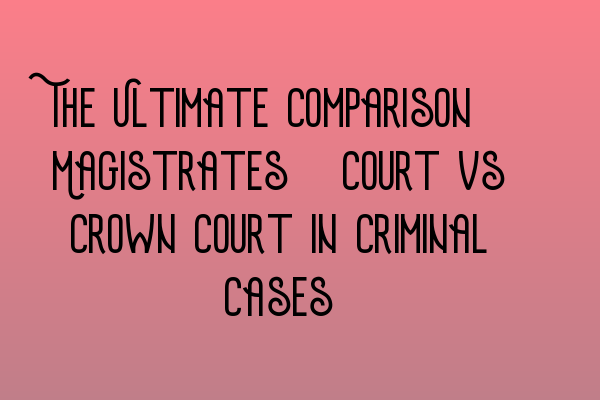The Ultimate Comparison: Magistrates’ Court vs Crown Court in Criminal Cases
When it comes to criminal cases in the United Kingdom, the legal process can be complex and overwhelming. Understanding the differences between the Magistrates’ Court and the Crown Court is essential for both defendants and those seeking legal advice. In this article, we will provide an ultimate comparison between these two courts, highlighting their key features and functions.
Magistrates’ Court
The Magistrates’ Court is the lower court in the UK’s criminal justice system. It primarily deals with less serious offenses, referred to as summary offenses. These offenses include minor criminal charges such as petty theft, public disorder, and traffic violations. The court is presided over by a panel of three magistrates or a single District Judge.
One significant advantage of the Magistrates’ Court is that it allows for a relatively quick resolution of cases. The court aims to provide a swift verdict, which can be beneficial for both the defendant and the wider justice system. However, it’s important to note that defendants have the right to choose to have their case heard in the Crown Court in some circumstances.
Key Features:
- Deals with summary offenses
- Presided over by a panel of magistrates or a District Judge
- Quick resolution of cases
- Defendants have the right to choose the Crown Court in some circumstances
Related Article: Legal Representation for Delaware LLCs in the UK: Expert Advice
Crown Court
The Crown Court is the higher court in the UK’s criminal justice system, dealing with more serious offenses, often referred to as indictable offenses. These offenses include major criminal charges such as murder, rape, and drug trafficking. The court is presided over by a judge and a jury, ensuring a fair trial.
Unlike the Magistrates’ Court, the Crown Court has the authority to impose longer and more severe sentences. It provides a more formal setting and allows for more extensive examination and cross-examination of witnesses. Additionally, defendants are entitled to legal representation, and their legal expenses may be covered by legal aid, subject to eligibility.
Key Features:
- Deals with indictable offenses
- Presided over by a judge and a jury
- Imposes longer and more severe sentences
- Allows for thorough examination and cross-examination of witnesses
- Defendants entitled to legal representation with possible legal aid coverage
Related Articles:
Ensuring Ethical Business Practices: Delaware’s Code of Conduct,
Legal Challenges for UK Businesses in the U.S.: Strategies for Overcoming Hurdles,
UK Criminal Law: An In-Depth Analysis of the British Legal System,
Legal Challenges for UK Businesses in the U.S.: Strategies for Overcoming Hurdles
Which Court Should You Choose?
Deciding whether your case should be heard in the Magistrates’ Court or the Crown Court depends on several factors:
- The severity of the offense: Generally, more serious offenses are heard in the Crown Court.
- Legal representation: The Crown Court allows for legal representation, providing skilled advocacy and support throughout the trial.
- Desired trial process: The Magistrates’ Court offers a more streamlined and less formal trial process, while the Crown Court allows for a more comprehensive examination of evidence.
- Potential penalties: The Crown Court has the power to impose harsher penalties, including imprisonment.
Ultimately, selecting the right court requires careful consideration and consultation with legal professionals who can provide expert advice based on your specific circumstances.
In conclusion, the Magistrates’ Court and the Crown Court serve distinct roles in the UK’s criminal justice system. The Magistrates’ Court handles summary offenses swiftly, while the Crown Court deals with more serious indictable offenses in a formal trial setting. Understanding the differences and weighing the factors can greatly impact the outcome of your case.
